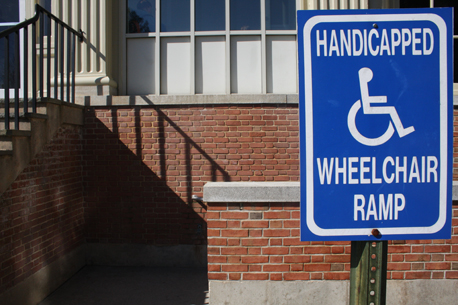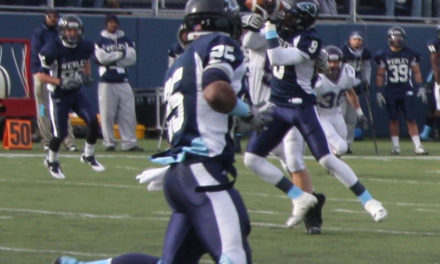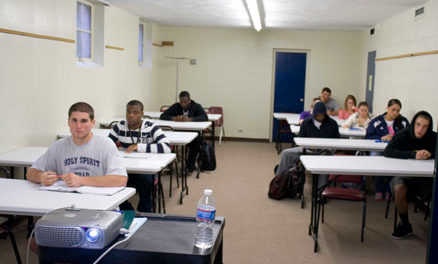
Those in wheelchairs must take this ramp to underground in order to enter College Center. The Whetstone/ Cochise Lucas
By Chris Agar (Whetstone Staff Writer)
Taking the trash out has been a rite of passage for men and boys for decades.
For Jeremy Meyers, a former Wesley College student who suffers from cerebral palsy and can only get around with a scooter, it was excruciating.
“It is painful for a person like myself to walk all the way to the dumpster,” he says. “For many people, that may sound crazy, but they do not understand the kind of pain I am in.”
Taking the trash out presented Meyers with still another problem.
“I could not fit the [trash] bag in the scooter,” he said.
According to Meyers, this was but one of many inconveniences he had experienced at Wesley; so, he transferred after the Fall 2009 semester because he said that the school was not handicap accessible.
“I do not believe appropriate accommodations were made by Wesley to ensure Jeremy’s needs were met,” said Lori Meyers, Jeremy’s mother.
However, school officials believe they did what they could.
“The campus is compliant with disability requirements,” said Eric Nelson, vice president of finance and director of human resources. “For example, once you reach the ground floor [of the College Center] you can get up to any of the other floors or any of the other academic buildings to go to classes.”
Meyers complained that the doorways to Cannon and Slaybaugh halls were not accessible.
“When I went to class, I had to park my scooter near the gym and walk to class because the doors are not handicap-accessible,” Meyers said. “It is hard to fit my scooter in the doorway.”
The American Disabilities Act (ADA) requires that every door be at least 32 inches wide so a wheelchair or scooter can fit. A measurement of the entrance to Slaybaugh Hall showed that the door was only 28 inches wide. Since Slaybaugh is an existing building, Wesley does not have to increase the width if it might cause architectural damage.
“We would have to change the types of doors that are on there,” Nelson said.   “Right now there are two swinging doors in all of those academic areas. Because they are double doors, certainly when you open both of them it’s wider than the 32 inches.”
Instead of providing automatic door openers, Nelson said Wesley provides a different accommodation.
“If [a student] has a problem and we know the class schedule, then we can help by having a person open the door for them,” Nelson said. “Each of the buildings has an academic secretary and if they know the schedule, they will open the doors for [a student] and assist them into the building.”
A student has to request this service to administration.
“It’s a big switch for student coming in their freshman year because they’re used to a high school saying, ‘OK, we know this, we’ll [help the student],'” said Mary-Alice Ozechoski, dean of students. “We have to be told about [a problem]. It’s a privacy issue.”
The school also ensures that its residence halls are accessible to disabled students.
“Most of our facilities are handicapped-accessible,” said Kevin Hansbury, director of residence life. “We have Malmberg Hall which has an elevator. Some of our rooms in Malmberg are specifically handicapped equipped.”
The handicapped-equipped rooms include wider doorways so wheelchairs can fit through and bathrooms with grab bars and sit-baths so a student may easily take a shower.
Wesley also has some dorm buildings that are not accessible.
“The two facilities that aren’t handicapped-accessible are Williams and Gooding,” Hansbury said. “They are a couple of our older buildings and it’s just the way they were built.”
Aside from students with physical disabilities, Wesley also offers accommodations for students with learning disabilities.
“If a student had a learning disability, they might get extra time [to work on a test],” said Christine McDermott, coordinator of disability support. “Usually that means that they would come out of the classroom and they would come up to [her office] and take the test in the library.”
The Meyers family says their experiences contradict the statements made by Wesley administrators.
“I did try to contact school administrators at Wesley,” Lori Meyers said. “Phone calls did not help. I felt the administrators did not want to hear about Jeremy’s problems and were not willing to help.”
Her son echoes these sentiments.
“My mother and I would try to solve problems with Kevin [Hansbury] or the dean of students and it would not get anywhere,” Jeremy said. “The faculty and staff do not really talk to each other efficiently.”
Eric Nelson tried to explain this issue.
“I think he went to the people in Student Services and Student Life because they are the front line contacts for students,” he said. “If they felt they could accommodate his requests they would then contact me.
However, the school stands by their assertion that they are indeed handicapped-accessible.
“We’re small enough that you can get around on campus pretty easily,” Ozechoski said. “As a small institution it’s going to be a very different experience [for a student] than someone who goes to large institution that’s going to have to navigate a much larger campus physically and probably not have that one-on-one service that we’ve been able to offer.”
Kyle Hodges of the State Council for Peoples with Disabilities said that while it is not required for Wesley to have automatic doors, an on-site visit would be required to accurately state whether Wesley is following ADA guidelines or not.
In the mean time, Meyers has moved on from Wesley.
After spending this semester at the Community College of Baltimore County, he will conclude his college career at Salisbury University. He is looking forward to the change in environment.
“It is totally different from Wesley,” he said. “Every building has an elevator and the doors open automatically. They also have a shuttle service to places on campus and in the community.”




